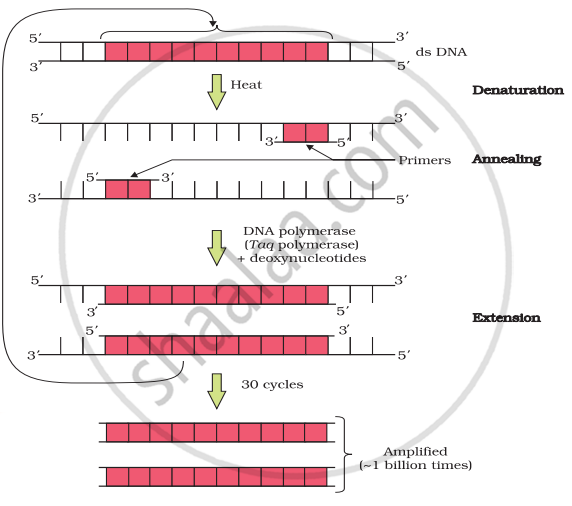Advertisements
Advertisements
प्रश्न
State the advantage of using Thermostable DNA polymerase.
उत्तर
Taq polymerase is frequently used in PCR to amplify target DNA because it processes several advantages such as:
Thermostability: A bacteria found in hot springs produces taq polymerase, a thermostable DNA polymerase. It can endure the high temperature of >90°C necessary for the PCR reducing stage and still maintain its enzyme activity after each cycle.
Efficiency: Normal DNA polymerases are unable to tolerate the high temperatures in PCR since their optimal operating temperature is around 37°C. After each cycle, new enzymes must be introduced, requiring vast quantities of DNA polymerase and constant handling throughout the PCR procedure. Taq polymerase continues to show enzymatic activity following each high-temperature cycle, which greatly increases efficiency and lowers the cost.
High amplification capacity: The ideal range for Taq polymerase's enzymatic activity is between 75 and 80 °C. At 72 degrees Celsius, it can replicate a 1000 base pair segment of DNA in less than ten seconds after it achieves its optimum temperature.
संबंधित प्रश्न
Explain briefly:
Chitinase
Prepare a flow chart in formation of recombinant DNA by the action of restriction endonuclease enzyme EcoRI.
Gene Amplification using primers can be done by ______.
During the purification process for recombinant DNA technology, the addition of chilled ethanol precipitates out ______.
Significance of 'heat shock' method in bacterial transformation is to facilitate ______.
Which of the following should be chosen for best yield if one were to produce a recombinant protein in large amounts?
How is copy number of the plasmid vector related to yield of recombinant protein?
Identify and explain steps ‘A’, ‘B’ and ‘C’ in the PCR diagram given below.

Illustrate the design of a bioreactor. Highlight the difference between a flask in your laboratory and a bioreactor which allows cells to grow in a continuous culture system.
Write the scientific name of the source organism of the thermostable DNA polymerase used in PCR.
